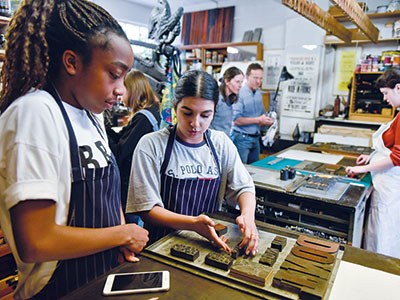It was mostly a week of celebration for FE providers, as five rose to ‘good’ Ofsted ratings.
Two of them achieved the feat in their first ever inspection.
However, one private provider fell to the ‘inadequate’, and another was brutally criticised in Ofsted’s first early-monitoring visit report on a newcomer to apprenticeships, prompting ministerial intervention.
Starting with the ‘good’ news: it was a great start to life as an employer provider for Specsavers Optical Superstores as it was given grade twos across the board in its first visit from the inspectorate.
The world’s largest privately owned optical group has a team who provide framework apprenticeships in optical retail, at intermediate level and standards-based apprenticeships in spectacle making at advanced level.
It trained over 500 learners last year.
Training leaders were praised for working “very closely” with Specsavers store directors to “ensure that apprenticeships meet their technical and customer service skills needs”.
Learners develop their work-related skills and improve their chances of gaining employment
Inspectors added that apprentices benefit from a “broad range” of very high-quality online learning materials, as well as high-quality off-the-job workshops, which “help apprentices quickly develop the knowledge, skills and behaviours that their employers seek”.
The other FE provider to achieve ‘good’ in its first ever inspection was Lionheart in the Community, based in London.
The not-for-profit organisation was rocked by the sudden collapses of First4Skills and Talent Training last year, but has since come out of the debacle on the other side.
At the time of inspection, LITC was training 450 adults through advanced learner loans.
Leaders were lauded for “successfully establishing a very welcoming environment” which meets the needs of the local community “very well”.
“Close links with employers and community groups support learners to develop their work-related skills and improve their chances of gaining employment,” Ofsted added.
“Learners are ambitious and the vast majority of them remain in employment, gain employment, or move into higher and further education after completing their course.”
The most glowing report came in for Leeds City College, which was given a grade two overall but ‘outstanding’ in three of the nine headline fields.
The chief executive and his team have “addressed successfully and swiftly” the main areas for improvement from the previous inspection on the 20,000-learner college.
“Staff have been highly effective in developing a curriculum that responds to the priorities of local employers for high-level skills and provides a route into employment for the most disadvantaged members of the community,” inspectors said.
‘Good’ news was also delivered to Cumbria County Council and Calderdale Metropolitan Borough Council this week as both adult and community learning providers rose from a grade three to a two.
“Senior leaders have been relentless in successfully eliminating the weaknesses identified at the previous inspection,” inspectors said about Cumbria, while at Calderdale, “managers rigorously monitor the performance of staff; this has resulted in improved quality and outcomes for learners”.
Senior leaders have been relentless in successfully eliminating weaknesses
On the flip side, Team Enterprises Ltd, based in Merseyside, went from a grade three to a four.
This small provider trained just shy of 300 apprentices and adult learners last year, but “too many” of them did not achieve their qualifications and complete their programmes.
Teaching, training, learning and assessment are “weak”, Ofsted said, adding: “Consequently, too few learners acquire new vocational knowledge, skills and understanding.”
Team Enterprises Ltd is currently on the government’s register of apprenticeship training providers but as a result of the grade four, which was given across the board including in apprenticeships, the ITP can now expect to be taken off of the list and be unable to deliver the provision in the future.
One of the most brutal Ofsted reports ever seen in FE was meanwhile published about Merseyside’s Key6 Group.
The monitoring visit report of the new apprenticeship provider said training was “not fit for purpose” and apprentices complained they were “not learning anything new”.
The report was so bad that skills minister Anne Milton had to immediately step in to stop the provider from taking on any new apprentices, which FE Week revealed yesterday.
It was also bad news for Thomas Rotherham College, a former sixth form college in south Yorkshire which converted to a 16 to 19 academy in November.
It went from a grade two to a three, and governors were slammed for being “distracted by their considerable work in securing the sustainability of the college through joining a multi-academy trust”.
As a result, “they do not provide sufficient challenge to leaders to ensure that the urgently needed improvements to A-level outcomes are made,” inspectors said.
Two other providers kept their grade two ratings this week following short inspections: The TTE Technical Training Group, a private provider based in Middlesbrough, and Wilberforce College, a sixth form college in Hull.
| GFE Colleges | Inspected | Published | Grade | Previous grade |
| Leeds City College | 06/02/2018 | 16/03/2018 | 2 | 3 |
| 16-19 academy | Inspected | Published | Grade | Previous grade |
| Thomas Rotherham College | 17/01/2018 | 13/03/2018 | 3 | 2 |
| Independent Learning Providers | Inspected | Published | Grade | Previous grade |
| Lionheart in the Community Limited | 06/02/2018 | 15/03/2018 | 2 | – |
| Key6 Group Limited | 15/02/2018 | 15/03/2018 | M | M |
| Team Enterprises Limited | 30/01/2018 | 13/03/2018 | 4 | 3 |
| Adult and Community Learning | Inspected | Published | Grade | Previous grade |
| Cumbria County Council | 30/01/2018 | 12/03/2018 | 2 | 3 |
| Calderdale Metropolitan Borough Council | 20/02/2018 | 12/03/2018 | 2 | 3 |
| Employer providers | Inspected | Published | Grade | Previous grade |
| Specsavers Optical Superstores Limited | 06/02/2018 | 14/03/2018 | 2 | – |
| Short inspections (remains grade 2) | Inspected | Published |
| The TTE Technical Training Group | 13/02/2018 | 15/03/2018 |
| Wilberforce College | 06/02/2018 | 12/03/2018 |




